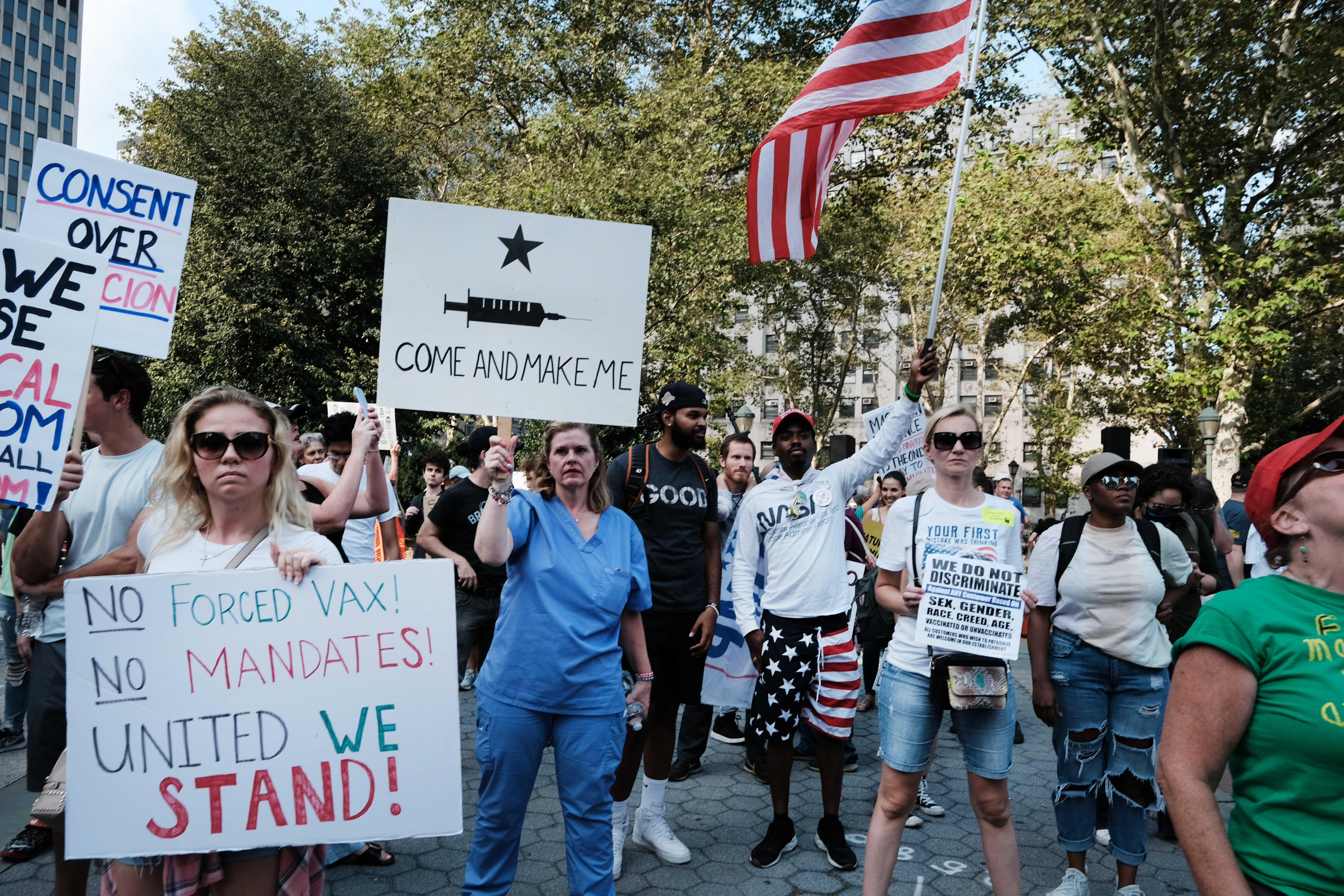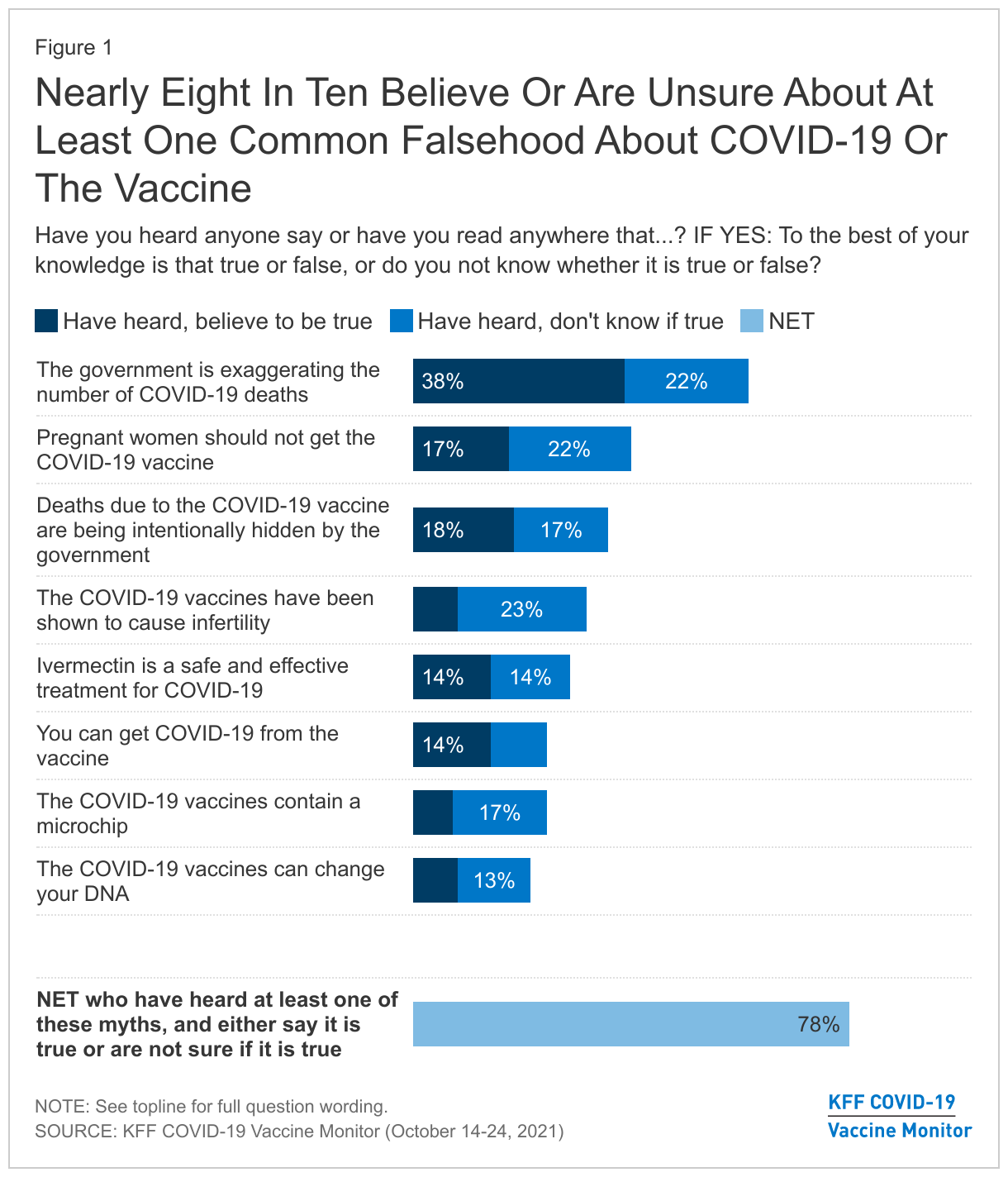Republicans are 3 times more likely than Democrats to believe falsehoods about COVID-19

A free daily email with the biggest news stories of the day – and the best features from TheWeek.com
You are now subscribed
Your newsletter sign-up was successful
A shocking number of Americans believe falsehoods about COVID-19 and the coronavirus vaccine, a Kaiser Family Foundation poll has found.
Nearly eight in 10, or 78 percent, of those polled said they either believed or were unsure about at least one false statement about COVID-19. The false statements included things like "COVID-19 vaccines have been shown to cause infertility" and "the COVID-19 vaccines contain a microchip."

Perhaps unsurprisingly, the poll found a major partisan split in the findings. "Nearly half (46%) of Republicans compared to just 14% of Democrats believe or are unsure about four or more misstatements about COVID-19," writes Kaiser. And 84% of Republicans believe or are unsure whether the government is exaggerating the number of COVID-19 deaths.
The Week
Escape your echo chamber. Get the facts behind the news, plus analysis from multiple perspectives.

Sign up for The Week's Free Newsletters
From our morning news briefing to a weekly Good News Newsletter, get the best of The Week delivered directly to your inbox.
From our morning news briefing to a weekly Good News Newsletter, get the best of The Week delivered directly to your inbox.
Only one in five adults surveyed didn't believe any of the eight falsehoods, while nearly half believed or were unsure about one to three of them. Aside from partisan differences, the other biggest gaps were between vaccinated and unvaccinated Americans — "Unvaccinated adults are at least 20 percentage points more likely than vaccinated adults to lack knowledge about each piece of misinformation tested," says Kaiser.
Kaiser Family Foundation surveyed 1,519 U.S. adults by phone between October 14-24. The margin of error was 3 percentage points. See more survey results here.
A free daily email with the biggest news stories of the day – and the best features from TheWeek.com
-
 5 cinematic cartoons about Bezos betting big on 'Melania'
5 cinematic cartoons about Bezos betting big on 'Melania'Cartoons Artists take on a girlboss, a fetching newspaper, and more
-
 The fall of the generals: China’s military purge
The fall of the generals: China’s military purgeIn the Spotlight Xi Jinping’s extraordinary removal of senior general proves that no-one is safe from anti-corruption drive that has investigated millions
-
 Why the Gorton and Denton by-election is a ‘Frankenstein’s monster’
Why the Gorton and Denton by-election is a ‘Frankenstein’s monster’Talking Point Reform and the Greens have the Labour seat in their sights, but the constituency’s complex demographics make messaging tricky
-
 A Nipah virus outbreak in India has brought back Covid-era surveillance
A Nipah virus outbreak in India has brought back Covid-era surveillanceUnder the radar The disease can spread through animals and humans
-
 Trump HHS slashes advised child vaccinations
Trump HHS slashes advised child vaccinationsSpeed Read In a widely condemned move, the CDC will now recommend that children get vaccinated against 11 communicable diseases, not 17
-
 Covid-19 mRNA vaccines could help fight cancer
Covid-19 mRNA vaccines could help fight cancerUnder the radar They boost the immune system
-
 FDA OKs generic abortion pill, riling the right
FDA OKs generic abortion pill, riling the rightSpeed Read The drug in question is a generic version of mifepristone, used to carry out two-thirds of US abortions
-
 The new Stratus Covid strain – and why it’s on the rise
The new Stratus Covid strain – and why it’s on the riseThe Explainer ‘No evidence’ new variant is more dangerous or that vaccines won’t work against it, say UK health experts
-
 RFK Jr. vaccine panel advises restricting MMRV shot
RFK Jr. vaccine panel advises restricting MMRV shotSpeed Read The committee voted to restrict access to a childhood vaccine against chickenpox
-
 Texas declares end to measles outbreak
Texas declares end to measles outbreakSpeed Read The vaccine-preventable disease is still spreading in neighboring states, Mexico and Canada
-
 RFK Jr. shuts down mRNA vaccine funding at agency
RFK Jr. shuts down mRNA vaccine funding at agencySpeed Read The decision canceled or modified 22 projects, primarily for work on vaccines and therapeutics for respiratory viruses